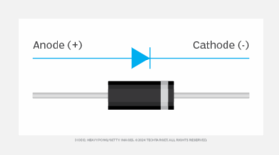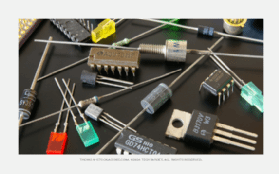What is a diode?
A diode is a specialized electronic component, specifically a two-terminal semiconductor device, with two electrodes called the anode and the cathode. It has several uses: as a one-way switch that enables current to flow easily in one direction while restricting its flow in the other direction, as a converter that changes alternating current into pulsating direct current, and as a circuit protector that limits the voltage in the circuit. Diodes are also used in clamping circuits and logical gates.
Diode construction
Most diodes are made with semiconductor materials such as silicon, germanium or selenium. Other semiconducting materials like gallium arsenide can also be used to construct diodes.
Some diodes are composed of metal electrodes in a chamber evacuated or filled with a pure elemental gas at low pressure. Two equivalently doped P-type and N-type semiconductors are joined together, and electrode terminals are attached to each end to create a P-N junction diode. This results in the holes in the P-type semiconductor attracting electrons from the N-type material. It is this attraction that causes the electrons to diffuse and occupy the holes, and lets current pass through the diode.
The P-type material with its excess holes is positively charged. It is known as the positive lead or anode. In contrast, the N-type material with excess electrons is negatively charged and known as the negative lead or cathode.

The movement of electrons also creates what is known as a depletion layer between the P-type and N-type materials. The depletion layer, also known as a depletion region, is a thin area that's depleted of charge due to the movement, or diffusion, of electrons from the N-type material to the P-type material, and the diffusion of holes from the P-type material to the N-type material. Due to the charge depletion, this layer offers high resistance, meaning it opposes the further flow of electrons from the N-side to the P-side.
What is the function of a diode?
The fundamental property of a diode is to conduct electric current in only one direction. Diodes can be used as rectifiers, signal limiters, voltage regulators, switches, signal modulators, signal mixers, signal demodulators and oscillators.
Semiconductor diodes can be designed to produce direct current when visible light, infrared transmission or ultraviolet energy strikes them. These diodes are known as photovoltaic cells and are the basis for solar electric energy systems and photosensors.
Yet another form of diode, commonly used in electronic and computer equipment, emits visible light or infrared energy when current passes through it. Such a device is the familiar light-emitting diode (LED).
How does a diode work?
When the cathode is negatively charged relative to the anode at a voltage greater than a certain minimum, called forward breakover, then current flows through the diode. If the cathode is positive with respect to the anode, is at the same voltage as the anode or is negative by an amount less than the forward breakover voltage, then the diode does not conduct current. This is a simplistic view, but is true for diodes operating as rectifiers, switches and limiters. The forward breakover voltage is approximately 0.6 V for silicon devices, 0.3 V for germanium devices and 1 V for selenium devices.
The above general rule notwithstanding, if the cathode voltage is positive relative to the anode voltage by a great enough amount, the diode will conduct current. The voltage required to produce this phenomenon, known as the avalanche voltage, varies greatly depending on the nature of the semiconductor material from which the device is fabricated. The avalanche voltage can range from a few volts up to several hundred volts.
When an analog signal passes through a diode operating at or near its forward breakover point, the signal waveform is distorted. This nonlinearity enables modulation, demodulation and signal mixing. In addition, signals are generated at harmonics, or integral multiples of the input frequency. Some diodes also have a characteristic that is imprecisely termed negative resistance. Diodes of this type, with the application of a voltage at the correct level and the polarity, generate analog signals at microwave radio frequencies.
Forward bias and reverse bias in a diode
A semiconductor diode is forward biased when the anode's voltage is more positive than the cathode's voltage, causing the diode to conduct current easily. In contrast, it is reverse biased when the cathode voltage is more positive than the anode voltage, increasing resistance and hindering the current's flow.
Forward bias
In a semiconductor diode, forward bias occurs when the P-region connects with the positive terminal of a battery while the N-region is connected with its negative terminal. The voltage is applied in the forward direction, resulting in more holes getting pumped into the P-region and more electrons getting pumped into the N-region. The holes and electrons moving in opposite directions put pressure on the depletion layer, causing it to shrink and the diode to offer less resistance.
The electrons in the N-region overcome the depletion layer and flow to the P-region, causing the anode to be more positively biased than the cathode, which results in the current flow increasing in one direction. This process is known as rectification. The voltage level at which the depletion region completely disappears and causes the current to flow most easily -- it increases exponentially to the applied voltage -- is known as the threshold voltage, cutoff voltage or firing voltage.
Reverse bias
Reverse bias occurs when the diode's P-type region is connected to the battery's negative terminal while the N-type is connected to the positive terminal. This configuration causes the P-type to lose holes and the N-type to lose electrons. These actions cause electrons to get pulled away from the P-N junction and the diode to be depleted of charge, increasing the size of the depletion layer and the diode's resistance. High resistance stops the current from flowing through the diode, turning it into an insulator.
That said, a large current can suddenly pass through the diode when a certain voltage level is applied. This level is known as the breakdown voltage. Above the breakdown region, even a small change in the voltage will cause a large change in the current.
The forward bias and reverse bias properties of a semiconductor diode cause it to have an electrical conductivity value that's between the values of a conductor (very high) and insulator (zero or close to zero). An example of a conductor would be a metal like iron, whereas plastic, glass and rubber are types of electrical insulators.
Types of diodes
Many types of diodes are available depending on their construction and application.
Rectifier
One of the most common types of diodes is the rectifier. A rectifier is a P-N junction diode constructed of suitable semiconductor materials for the P-region and N-region. It lets the current flow only in the forward direction, i.e., when it is forward biased.

Zener diode
A Zener diode operates in reverse bias, letting the current flow in reverse, resulting in the Zener effect. The diode is also known as a breakdown diode since its cathode conducts current in reverse when a specific breakdown or threshold voltage is applied.
Until the voltage is applied, the Zener diode will not conduct electricity from the cathode, connected to a positive voltage, to the anode, usually connected to the ground. The property of Zener diodes to enable reverse current flow provides a stable reference voltage. This quality makes Zener diodes suitable for use in power supplies, surge suppressors, voltage shifters, waveform clippers and voltage regulators.
Schottky diode
A Schottky diode, also known as a hot carrier diode or low voltage diode, is formed by joining a semiconductor with a metal like platinum or aluminum. It has a lower forward voltage drop -- which occurs at low currents -- than conventional P-N junction diodes, and there are no stored charges in the junction, resulting in fast switching action. This makes Schottky diodes ideal for rectification applications, and for use in diode ring mixers and solar cell applications.
A key drawback of Schottky diodes is that they have a large reverse saturation current, so they cannot withstand high voltage. Also, they have a narrow depletion zone, causing high leakage currents.
Laser diode
A laser diode converts electricity into light that's emitted in a tight beam. The conversion happens when an electrical current is applied to the diode, causing the electrons and holes in a P-N junction to recombine and release energy. This energy is in the form of photons of coherent light of a specific phase and wavelength. Laser diodes have numerous applications, including optical drives, barcode readers, laser printing and scanning, telecommunications and fiber optics, engraving, and laser pointers.
Light-emitting diode
Like laser diodes, LEDs generate light on the application of an electrical current. However, there are several differences between LEDs and laser diodes.
Light-emitting diodes provide incoherent light that spreads out, whereas the light emitted by laser diodes is coherent and travels in a dense, straight beam. LEDs also have lower power output, are less expensive, and have larger intrinsic and active regions than laser diodes. Common applications of LEDs include lighting, displays and remote controls.
Learn more about the state of the U.S. semiconductor market and read about 4K video resolution in the enterprise.
